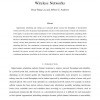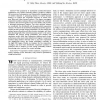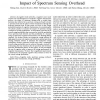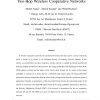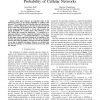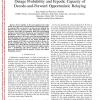153
click to vote
CORR
2011
Springer
14 years 5 months ago
2011
Springer
Opportunistic scheduling and routing can in principle greatly increase the throughput of decentralized wireless networks, but to be practical such algorithms must do so with small...
163
click to vote
CORR
2011
Springer
14 years 5 months ago
2011
Springer
—Multi-cell cooperation is a promising approach for mitigating inter-cell interference in dense cellular networks. Quantifying the performance of multi-cell cooperation is challe...
135
Voted
TWC
2010
14 years 8 months ago
2010
The popularity of multimedia multicast/broadcast applications over wireless networks makes it critical to address the error-prone, heterogeneous and dynamically changing nature of ...
140
click to vote
TWC
2010
14 years 8 months ago
2010
In cognitive radio networks, a cognitive source node requires two essential phases to complete a cognitive transmission process: the phase of spectrum sensing with a certain time d...
129
click to vote
TWC
2010
14 years 8 months ago
2010
In wireless cooperative networks, the asynchronism between the relays can be a source of diversity which is similar in its essence to the multipath diversity of frequency selectiv...
114
click to vote
TSP
2010
14 years 8 months ago
2010
In this paper, an adaptive cooperation diversity scheme with best-relay selection is proposed for multiple-relay cognitive radio networks to improve the performance of secondary tr...
123
click to vote
CORR
2011
Springer
14 years 9 months ago
2011
Springer
The outage probability limit is a fundamental and achievable lower bound on the word error rate of coded communication systems affected by fading. This limit is mainly determined ...
157
Voted
ICC
2009
IEEE
14 years 12 months ago
2009
IEEE
This paper proposes an analytical study of the shadowing impact on the outage probability in cellular radio networks. We establish that the downlink other-cell interference factor,...
151
click to vote
GLOBECOM
2009
IEEE
14 years 12 months ago
2009
IEEE
Due to the limited energy supplies of nodes in many applications like wireless sensor networks, energy efficiency is crucial for extending the lifetime of these networks. This pape...
127
click to vote
GLOBECOM
2009
IEEE
14 years 12 months ago
2009
IEEE
Exact statistics of the local signal-to-noise ratios (SNRs) of the best relay in decode-and-forward (DF) opportunistic relaying (ORe) are derived. It is observed that although the ...
